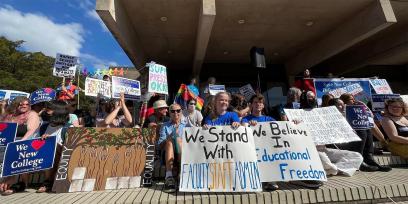The climate in Florida just keeps getting worse—and it’s not only because it’s hurricane season. In a state where the “Stop WOKE” law prevents teaching about diversity, equity and inclusion and teachers lose their jobs over flying Black Lives Matter flags, far-right politicians are also going after the academic freedom made possible by faculty tenure.
Of course, unions are fighting back. On Aug. 7, the AFT announced that three of its affiliates—the United Faculty of Florida and UFF’s Florida State University and University of Florida chapters—filed a lawsuit to prevent university presidents from having sole discretion over firing tenured professors. Such practice flies in the face of legally guaranteed, neutral arbitration, and is especially dangerous because many of these presidents are political appointees of a governor known for assaulting higher education as we know it.
Unpacking the threat
One of the benefits unions have brought to the workplace is due process: When the boss fires you, you get to ask why. Did they let you go for just cause? Or simply because they disagree with your politics?
It’s an especially relevant question on college campuses, where professors are expected to conduct cutting-edge research, explore fresh ideas and lay out all sides of an issue for their students, who deserve to have the broadest learning landscape possible. But academic inquiry is notoriously sticky.
That’s why we have tenure. Tenured faculty are protected from arbitrary dismissal so they can conduct research and teach without trustees and administrators breathing down their necks. Teaching about climate change? Even if there’s an oil baron on the board of trustees, your job should be safe.
Florida’s Senate Bill 266 changes all that. It requires five-year reviews of all tenured professors, challenging the entire premise of tenure. And it allows faculty to be fired without the usual neutral-party arbitration—arbitration designed to protect academic freedom and employment rights. The bill places the final decision regarding faculty dismissal with politically appointed university presidents.
So if you belong to a different political party, inadvertently offend an important donor or, as one former faculty member put it in the Washington Times, have a fender bender with the president’s spouse, you could be dismissed with little recourse.
“Rather than follow the guidance of an impartial arbitrator, [this] law allows employers to make unilateral decisions that affect the livelihood of thousands of workers in the state of Florida,” says AFT President Randi Weingarten. “We must stand up for the rule of law, and for freedom of contract and freedom of speech, not just for those we agree with, but for everyone. Gov. Ron DeSantis and Commissioner of Education Manny Diaz Jr. want to do the opposite—and that is why we’re taking them to court.”
This is UFF’s second challenge to SB 266’s arbitration ban. Its first suit calls the ban a violation of the right to collective bargaining and alleges it breaks UFF’s collective bargaining agreements. That suit is centered on New College of Florida, where DeSantis has appointed political allies who have turned a campus known for its diversity and inclusion upside down. New College faculty also filed a suit Aug. 6.
“It’s a special kind of circular logic that has to take place when you tout higher education as the reason your state’s education system is doing well and, in the same breath, actively take away rights from the very employees that make Florida’s university system one of the most respected in the nation,” says Florida Education Association President Andrew Spar. “Yet this is exactly what workers have come to expect from Gov. DeSantis and Commissioner Diaz Jr. They pretend to care about teachers, professors, students and workers and then turn around and make policies and decisions that go against their interests, usually in favor of their own political ideology.”
“We must ask ourselves who a law like this truly serves. Because it’s not faculty members, it’s not graduate assistants, it’s not our students and it’s not our state,” says UFF President Teresa M. Hodge. “At the United Faculty of Florida, we remain firm in our commitment to ensure Florida’s higher education faculty, graduate assistants, DRS schools [Developmental Research Schools at Florida Agricultural and Mechanical University] and students are represented and advocated for at all levels of our state. Every employee in Florida has the constitutional right to join a union and to collectively bargain for better working conditions. UFF will never stop fighting for these protections.”
[Virginia Myers]

